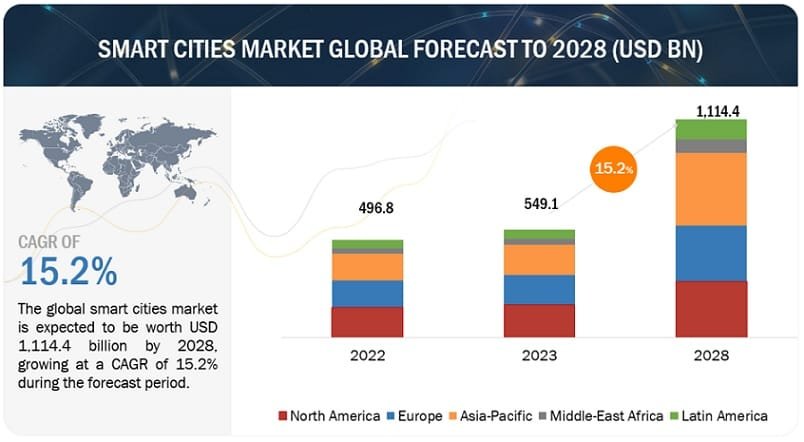As urban areas in the Philippines face the pressures of rapid growth, Smart City Projects Philippines are emerging as essential solutions to reshape the country’s urban landscape. By 2050, projections indicate that nearly 102 million Filipinos will live in urban areas, almost double the current population. This surge emphasizes the need for innovative, technology-driven urban solutions to support sustainable growth. Let’s take a look!

Government Commitment to Smart City Projects Philippines
Local governments across the Philippines are demonstrating a strong commitment to smart city projects, with 70% of urban local government units (LGUs) planning or already implementing these initiatives. This substantial involvement shows a shared vision among LGUs to make cities safer, more efficient, and environmentally friendly.
These efforts for Smart City Projects Philippines receive crucial backing from the government. It has earmarked $26 billion of the national budget—representing 5.7% of GDP—for infrastructure improvements in 2024. Through the Build Better More program, the Philippines aims to meet the infrastructure demands of rapidly expanding cities while ensuring urban resilience and efficiency.
Read More: It’s Better to Choose Modular Construction in the Philippines
Public-Private Partnerships: Driving Innovation
To support the ambitious agenda of Smart City Projects Philippines, the Marcos administration is encouraging public-private partnerships (PPPs) as a means to fund and expedite construction projects. This collaboration with private enterprises has proven instrumental in advancing construction technologies, integrating AI, and modernizing urban infrastructure.
One significant example is the $5 million project by Iveda, aimed at implementing artificial intelligence across major cities, including Cebu and Davao. By integrating AI, cities can optimize public safety, streamline city management, and set new standards for urban construction projects in the country.
Read More: Public-Private Partnerships Philippines Behind the Country’s Growth
Furthermore, collaborative efforts are fundamental to the success of smart city projects in the Philippines. Nearly 56% of LGUs have established partnerships to support these initiatives, reinforcing the idea that working together can drive meaningful progress. These collaborations bring in expertise and resources from multiple sectors, creating a pathway for transformative projects that reshape Filipino cities.
Sustainable Smart City Projects Philippines: An Eco-Friendly Approach
In addition to advancing technology, smart city projects in the Philippines emphasize sustainability. The New Manila Bay – City of Pearl project, for example, aims to become a self-sufficient smart city, utilizing solar canopies and stormwater recycling systems. Such sustainable features represent a growing focus on eco-friendly practices within urban development. It’s setting an example of how urban infrastructure can support both residents and the environment.
Smart Technology Integration in Construction
Smart cities in the Philippines are not just about futuristic tech—they’re about transforming urban development into a sustainable, tech-integrated endeavor. Approximately 72% of LGUs have allocated budgets for these projects, underlining a national commitment to embedding smart technologies into construction and development. These technologies bring a wave of innovation to the construction industry, from smart traffic systems to efficient energy management solutions, leading to enhanced infrastructure that meets modern urban demands.
Read More: Advanced Technology in Philippines Construction to Transform the Sector
Smart City Projects Philippines: Building the Cities of Tomorrow
The growth of smart cities in the Philippines is more than a technological trend; it’s a necessary response to urbanization and environmental challenges. As LGUs, private enterprises, and the government work together to build resilient, efficient, and sustainable cities, the construction industry is undergoing a transformation. As a result, it’s setting the Philippines on a path to a more innovative, connected urban future.

